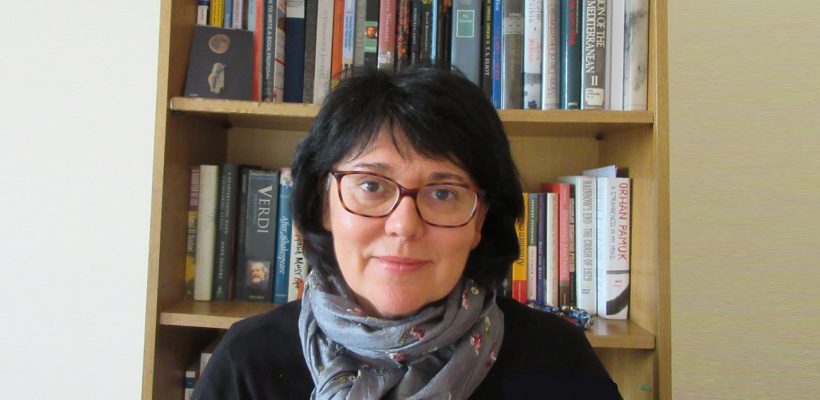
AUA Acopian Center Hosts First Fellow, Dr. Christine Sturm
3 min readThe American University of Armenia (AUA) Acopian Center for the Environment is hosting its first Fellow, Dr. Christine Sturm, who will focus her work on sustainable energy issues. The term of her fellowship started in September 2018 and will end in April 2019.
Dr. Sturm will be teaching two courses on the challenges of transitioning from conventional energy systems (coal, gas, and nuclear) to a system with a large share of renewable sources (solar, wind, geothermal, etc.).
The first course, currently being offered, is a high-level seminar with Armenian energy sector professionals and interested students. The second course, to be held in Spring 2019, will be a graduate level seminar for AUA students.
Dr. Sturm brings to Armenia her many years of professional experience and her PhD research on Germany’s energy transition, Energiewende. Her career started in 1984 at the Institute for Chemical and Biochemical Energy in Bucharest. She coordinated a pilot project for coal gasification from planning to operation. Then, in 1987, she worked in Romania’s Electricity and Heat Generation planning department, which optimized Romania’s power plants.
Between 1992 and 2004 she worked in the central energy departments of large and energy-intensive paper manufacturers (Stora Feldmuehle AG, Duesseldorf; Haindl Papier GmbH, Augsburg; UPM Kymmene OY, Augsburg). At these manufacturers, she was responsible for developing new power plant concepts and energy procurement.
In the late 1990s and early 2000s, while working for Haindl Papier GmbH, she led negotiations for the deregulation of the German gas market on behalf of the Federal Association of Germany’s Industry (BDI) and the Association of Large Industrial Energy Consumers (VIK).
From 2004 to 2016 she held several high-level management positions within the renewable energy arm of RWE, one of Germany’s largest utility companies. She led various departments including Energy Management, Feedstock Management, and Fuel and Disposal Management.
While working at RWE, Dr. Sturm enrolled in Arizona State University’s School of Sustainability and was awarded her PhD in May 2018. She intended to use her experience in the energy sector to analyze Germany’s energy transition and why it failed to achieve its decarbonization goals. The PhD research allowed her to set her broad experience with the Energiewende within relevant academic literature and analytic frameworks.
Her research and dissertation focuses on problems related to Germany’s energy transition and the lessons political and industrial decision-makers could learn to pursue more successful methods of decarbonization.
Dr. Sturm found that in their desire to please constituents, German politicians changed the nation’s energy system too quickly and failed to coordinate their efforts. While it became easier to produce and use renewable electricity, policy makers failed to coordinate deployment with the necessary grid expansion plans and greater power storage abilities.
Although they assumed that technological breakthroughs would occur, the rules and regulations they implemented favored mature technologies, and they failed to set the right incentives to incentivize advancements.
Additionally, the lack of a coherent action plan resulted in a multitude of overlapping and conflicting rules that failed to lead to the desired outcomes. During the transition process Energiewende goals got mixed up, developing a number of undesired dynamics.
What draws Dr. Sturm to study energy sustainability is the question of how to manage the variety of unintended consequences that occur when humans try to steer their energy systems and their economies away from fossil and nuclear fuels. Additionally, she is interested in how actors respond to challenges when managing the transition process.
Dr. Sturm hopes that her research will increase other nations’ awareness about the challenges related to energy transitions. She also hopes that the errors and lessons drawn from the Energiewende will help Armenia and other countries avoid some of Germany’s mistakes.
The AUA Acopian Center for the Environment, a research center of the American University of Armenia, promotes the protection and restoration of the natural environment through research, education, and community outreach. AUA Acopian Center’s focus areas include sustainable natural resource management, biodiversity and conservation, greening the built environment, clean energy, and energy efficiency, as well as information technology and the environment.
